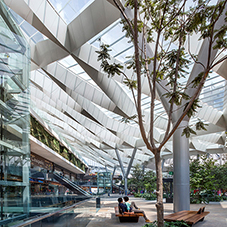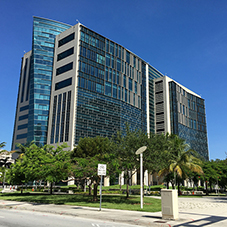Kuraray launches revolutionary new app for calculating and designing glass structures using artificial intelligence.
Kuraray’s "Sound Lab AI" web application, used to calculate sound-insulation values of glass systems according to European and American standards, received a positive response and broad acceptance from planners and engineers across the globe.
Based on the positive experience of this app, Kuraray has since undertaken development work on another app for the calculation of glass structures. The end result being a powerful AI-based application that can be used for the calculation behind various glazing systems, with regard to their static load-bearing capacity and serviceability.
Software solutions previously available on the market use complex numerical methods, such as finite-element analysis, simple analytical models or database queries, but Kuraray’s new "Strength Lab AI" app has been designed and implemented completely differently.
Using artificial intelligence, or, more precisely, "deep learning" using neural networks, it is possible to use AI algorithms to completely replace classical structural-analysis tasks with regard to the structural assessment in the ultimate limit states and serviceability limit states according to the German DIN 18008, the European EN16612 and the American ASTM E1300 for geometric linear and non-linear calculations. As a result, the use of costly and time-consuming simulation software is no longer necessary.
"The capabilities of Strength Lab AI goes far beyond the complexity of known calculations for sound insulation values of glass systems and is tangential to safety-relevant aspects due to the assessment of the load-bearing capacities of the glazing. Until now, such statements could only be achieved by expensive numerical simulations, which are usually not used in practice due to the long computing times and increased modeling requirements," says Dr. Michael Kraus, CEO of M&M Network-Ing, which exclusively developed the AI apps for Kuraray.
The app will be available as a limited free online version in September, while a "pro version", with expanded calculation capabilities, greater user convenience and enhanced functionality, will be released at a later date.
In operation, the app first queries all relevant key points for performing a structural analysis, including glazing support conditions and glazing loading. about it then looks at area loads or spar loads, the glass structure and the essential properties of the glass, especially the lamination materials, before special AI models arrive at the stresses and deformations of the glazing, based on the inputted data.
M&M's custom-developed method uses neural network algorithms and approximately 22 million data points for training. Unlike conventional approaches, M&M uses a special 'Mixture of Experts' model, comprising three different expert networks. This system enables comprehensive coverage of the entire data distribution across the different glass build-up and load scenarios, without the usual generalization issues of conventional AI architectures.
The new solution leverages the strengths of model-based neural networks, rather than the processing of large amounts of data in the case of database solutions. As a result, alternatives – that can be evaluated efficiently and cost-effectively – are available at the time of inference for the prediction of stresses and deformations for geometrically linear and non-linear cases.
Dr. Kraus comments: "For the first time, we have performed safety-critical calculations using AI on a practical scale, which enables resource-saving construction through fast system feedback. Our app allows computations to be performed at a much higher speed than comparable, more expensive simulations. Most of the results are available in seconds, whereas conventional and more complex systems can take up to ten minutes. You won't currently find a faster system on the market with the same accuracy.
“In addition, the app allows calculations based on different standards without additional costs. We believe that we owe this to our customers, planners, engineers, and also the environment, through our combined expertise at the interface of civil engineering and artificial intelligence. Cost-effectiveness considerations, by evaluating and assessing design alternatives, as well as a resource-conserving approaches, can be considered and carried out already in the planning phase. Any considerations later, during construction, make little sense and result in expensive rescheduling!
“The development and use of individualized AI algorithms to increase economic efficiency and sustainability in the calculation and design of glass structures was a logical step for the cooperation of Kuraray and software developer M & M Network-Ing UG as our contribution to sustainability claims an example of a showcase for the construction industry."
A comprehensive, detailed scientific publication on the new application program, its systematics and scientific background is planned by Kuraray and M & M for the first quarter of 2024.
Strength Lab AI sets standards for calculating glass structures
| T | +44 (0) 7408850523 |
|---|---|
| E | allan.gibson@kuraray.com |
| W | Visit Kuraray Trosifol® SentryGlas®'s website |
| Kuraray Europe GmbH, PVB Division, Muelheimer Str. 26, Gate 3 Building 362, Troisdorf, 53840, Germany |
Products by this Company
Categories
Insulation and sound control Glass Glazing systems

crop-comp267715.png)

